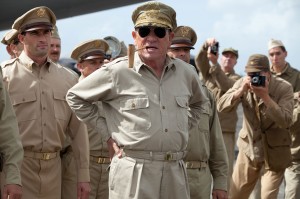Emperor fails to compel with needless romantic plot
Gen. Douglas MacArthur’s decision to pardon Japanese Emperor Hirohito of war crimes following World War II sparked controversy around the globe.
Emperor, a period piece with good intentions, but ultimately weak results, tries to psychoanalyze MacCarthur’s decision through the eyes of Bonner Fellers (Matthew Fox), a man who Director Peter Webber apparently believes played a much larger role in the decision than history remembers. The film has a lot of promise, with historical nuances and gorgeous production design, but the film’s threadbare storyline makes it fall flat.

Commanding performance · Tommy Lee Jones exceeds expectations as the legendary Douglas MacArthur in Emperor. Jones’ performance perfectly captures MacArthur’s brilliant, yet eccentric nature. – Courtesy of Kirsty Griffin
Emperor follows Bonner as he seeks to uncover Hirohito’s true involvement in the war. The main premise of this film relies heavily on the audience not actually knowing who Bonner is. In actuality, he is a little-known soldier who is better known for having his codes decoded by the Germans than for his postwar diplomacy. Still, following the end of World War II, MacArthur appointed Bonner to determine whether Hirohito should be tried for war crimes.
There is no question that the history surrounding the film is intriguing, but Webber tries to stretch reality a bit too far when he makes one of Bonner’s primary missions in the film locating a mysterious Japanese woman, Aya Shimada (Eriko Hatsune), whom he met years before in the United States when she was an exchange student.
The problem with Shimada is that she has little relevance to the fate of the emperor. Though she helps fuel Bonner’s interest in Japanese culture, she does little else. Bonners and Aya’s love story also lacks chemistry.
Despite that, the film constantly switches back to Aya as Bonner comes closer to making perhaps the most influential decision in the Japan’s history. Other than the fact that Aya lives in Japan, she has little to do with the main plot and her scenes — interspersed with those of Bonner interviewing various Japanese officials to gain more insight into Hirohito’s role — could easily be cut to give more room to the actual historical events unfolding in the film.
Emperor’s strengths, after all, are in its historical roots. As a period piece, nothing is more riveting then seeing actual footage of the events taking place, and Emperor does its job through a spectacular display of editing magic, seamlessly mixing real footage with the rest of the film. Scenes such as the opening, which uses footage from the dropping of the atomic bombs on Japan, is a chilling visual that instantly transports the audience to 1945.
The production design is equally spectacular. The team of cinematographer Stuart Dryburgh, production designer Grant Major and costume designer Ngila Dickson masterfully crafts a post-apocalyptic Japan on the verge of ruin. The attention to detail, from the decorations on MacArthur’s uniform to the mass of decay sprawled across the city, is remarkable.
But attention to detail does not make up for the weak storyline. Overall, Emperor just tries to do too much by cramming in the detail a period piece demands with the drama of taboo love. The ambition of this film leaves too many loose ends and creates an underlying feeling of discord.
Fox’s performance, in particular, leaves the audience with more questions than answers. When Bonner gets into a bar fight with some local patrons, it just seems to come out of nowhere. There is no buildup of frustration to justify his actions. Also, his anger doesn’t seem convincing. Fox’s forgettable performance in the film unfortunately might contribute to Bonner’s forgettable identity in history.
The larger-than-life persona of Gen. Douglas MacArthur, on the other hand, is portrayed masterfully by Tommy Lee Jones. In a role that requires a sense of authority and respect, Jones hits all the right notes with his tremendous talent. He carries a reputation as one of the most respected men in Hollywood, and it shows in his portrayal of MacArthur.
Jones’ MacArthur steals the spotlight in every scene that he is in and it is hilarious to watch Jones play this authoritative and quirky figure. Jones plays up MacArthur’s eccentricity, which is humorously noted in the film when the character makes a cameraman take several pictures of him every time he comes into a scene. Jones’ performance stands out as one of the most noteworthy aspects of this film, and it’s too bad the rest of the film can’t keep up with his excellence.
From the earliest stages of pre-production, this film carried with it high aspirations and ambitions. It could have been a remarkable period piece cross-examining one of the most vulnerable points in Japan’s history. Instead, its scattered plotline and unremarkable characters leave much to be desired.
